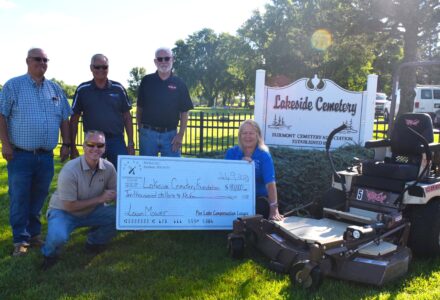Southern Plains Co-op lab in Winnebago helps special ed students recognize their skills
Southern Plains Education Cooperative likes the results it is seeing in a lab that lets special education students explore their talents.
Southern Plains offers services to five school districts — Blue Earth Area, Fairmont Area, Granada-Huntley East Chain, Martin County West, Truman and United South Central. The co-op has a campus in Winnebago.
Matt Nielsen is involved with the work-based learning program at Southern Plains and is a supervisor in the Practical Assessment Exploration System lab. Supervisors assess students, but the students also assess how much they like what they are doing. Nielsen said the purpose is to find the intersection of what students like and where they excel.
Southern Plains bought the program and began using it in the fall of 2016.
“What we’re trying to do is prepare students for what they want to do after high school,” Nielsen said. “Some might be going straight to work and some might go to a vocational program. The E is PAES is the exploration part.”
There are five areas in the lab: construction/industrial, processing/production, business/marketing computer technology and consumer/service.
In the construction/industrial area, students work with tools and learn skills such as measuring.
In process/production, there are items such as plumbing pieces. Students need to find all the right parts and put them together. Nielsen described the task as light assembly but also relating to cognition.
Business/marketing involves typing, adding, alphabetizing and using a cash register.
“Students usually really like that because it’s a job they can envision themselves doing because they’ve seen it,” Nielsen noted.
In computer technology, students work with documents and spreadsheets, write emails and perform data entry. They also try digital photography and put together PowerPoint presentations.
Consumer/service involves everything from weighing and measuring food products to making pancakes from scratch. There is also a big emphasis on cleaning, with students using a vacuum cleaner.
At the beginning of the class, students clock in, just like they would when starting a shift at a job. They then grab a folder that includes their tasks for the day.
“Everything they do is task-oriented and that’s the practical part of PAES,” Nielsen said. “Everything they do in here is linked to some sort of job. It’s part of Southern Plains’ overall mission to prepare students to transition to a work life.”
In the lab, supervisors do not instruct the students, as they are expected to follow the rules and procedures on their own, just as they would be expected to do in the workforce. Students use a stopwatch or a timer to keep track of how long it takes them to complete a task.
“We try to devalue the speed a little bit because students have a natural need to want to go fast, so we try to emphasize [that] employers want quality out of you,” Nielsen said. “Sometimes there are deadlines but a big emphasis is [that] quality is important.”
If a job is done incorrectly in any way, students must do it again, so students learn how important it is to follow procedures.
Students are “paid” an hourly amount based on their time and productivity. Their “pay” includes attitude points, credit for keeping the workplace clean and helping others.
Students maintain a “checkbook” and checking account. The lab has a little store that includes snacks and drinks, but also bigger items such as Bluetooth headphones.
“We try to get to the idea that your works leads to your ability to get money, and part of that is the spending decision,” said Nielsen, explaining that supervisors talk about instant gratification versus saving money to get something better.
Most of the students in the class are juniors and seniors. Students from any member school can be transported to Winnebago for the class.
The class is taught in three blocks per day, with no more than 10 students at a time. Students rotate to different areas every day.
Even though a student might prefer one area to the others, Nielsen said they are still assigned a mix of tasks each week.
“You might think to yourself, ‘I want to work on cars or in construction,’ but I promise you you’ll have to touch a computer at some point in your day,” he said.
Nielsen said an incredible amount of data is collected in the class.
“We take all the data collected, like how many jobs they’ve done, and give aptitude numbers. We also consider their interest,” he said.
The data gets back to teachers but Nielsen also reviews it with the students. Students receive a pass/fail grade in the class, but it is hoped they get a lot more out of it.
“We’re always emphasizing to the kids that we don’t care if they don’t like it, but in here we’re going to make recommendations on what they should pursue in the future,” Nielsen said.


